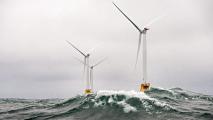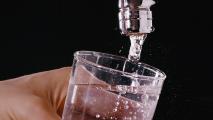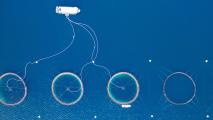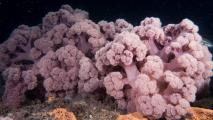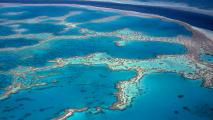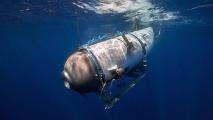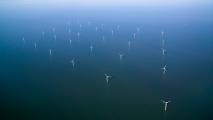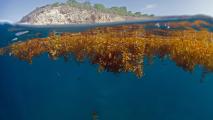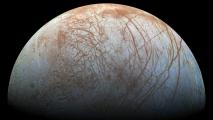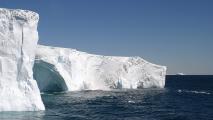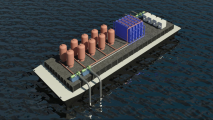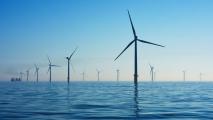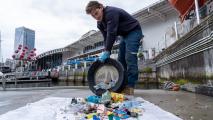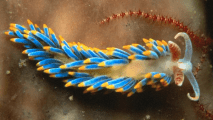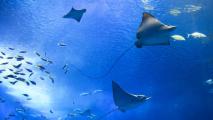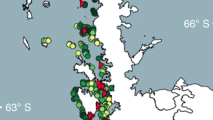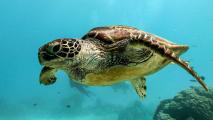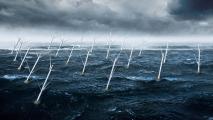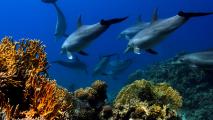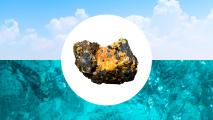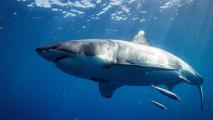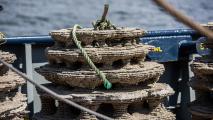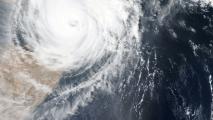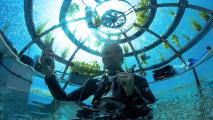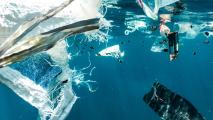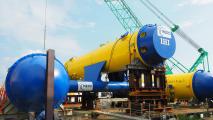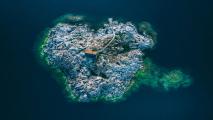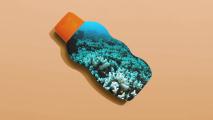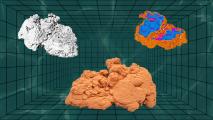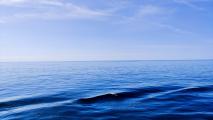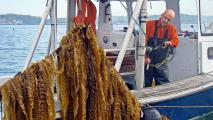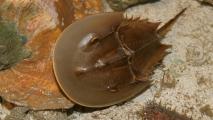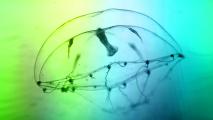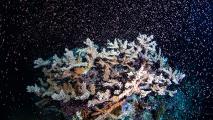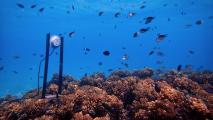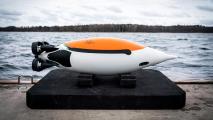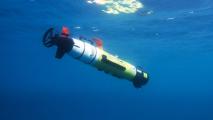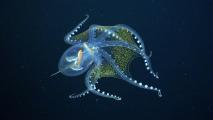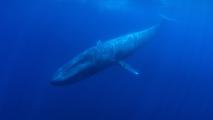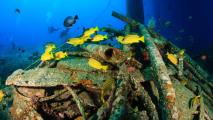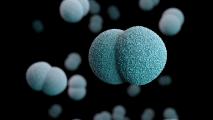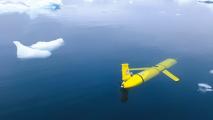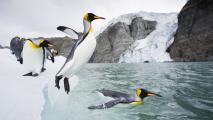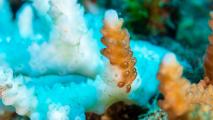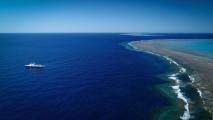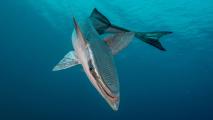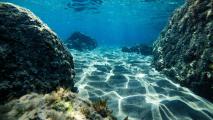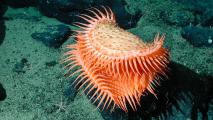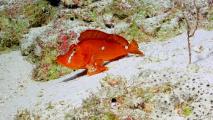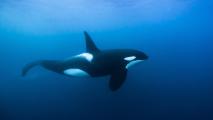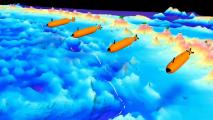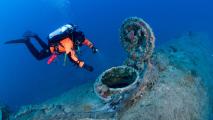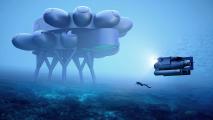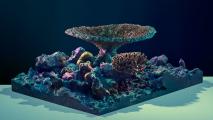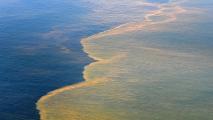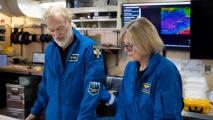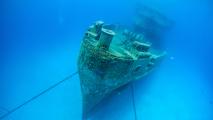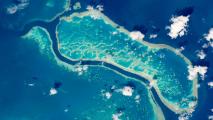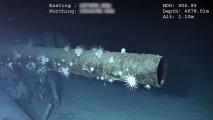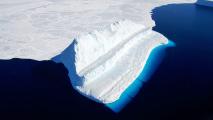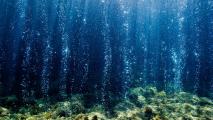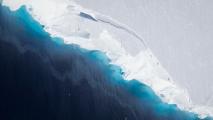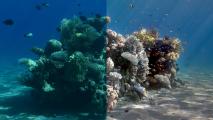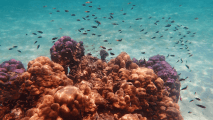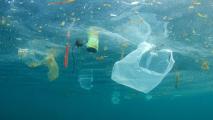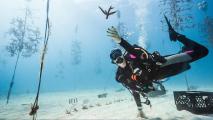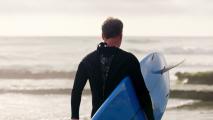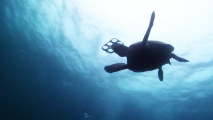Field: Oceans
Desalination could avert one of the top 10 threats facing the world
Desalination — changing seawater into safe drinking water — could avert a crisis. Here's how to make it less costly and labor-intensive.
Six innovative ways to float skyscraper-sized wind turbines
While most offshore wind farms are firmly rooted in the seabed, engineers are developing new ways to float enormous wind turbines.
Scientists have invented a method to break down “forever chemicals” in our drinking water
Researchers have discovered a way to eliminate "forever chemicals," or PFAS, which usually take hundreds or thousands of years to break down.
Artificial reef designed by MIT engineers could protect marine life, reduce storm damage
An MIT team is hoping to fortify coastlines with “architected” reefs engineered to mimic the wave-buffering effects of natural reefs.
Scientists are deep-freezing corals to repopulate the ocean
Healthy corals could disappear by the 2030s if climate change is not curbed, so scientists are deep freezing specimens.
How one startup is using the ocean to fight climate change
California startup Ebb Carbon wants to build the world’s largest marine CDR plant to capture CO2 in Port Angeles, Washington.
9 ways AI is helping tackle climate change
Existing AI systems include tools that predict weather, track icebergs, and identify pollution, all of which can help fight climate change.
Why the US has artificial reefs made from sunken ships and voting machines
Not all underwater reefs are made of coral − there are also artificial reefs made of sunken ships, radio towers, and more.
How marine permaculture could revolutionize ocean farming
Marine permaculture could contribute to ecosystem restoration and pollution reduction, as well as empower local communities.
T-Minus: SpaceX launches PACE, new ocean moon discovered, and more
Freethink's weekly countdown of the biggest space news, featuring the launch of PACE, the discovery of Mimas' ocean, and more.
Sex life discovery raises IVF hope for endangered purple cauliflower soft coral
The purple cauliflower soft coral Dendronephthya australis, now listed as an endangered species, has a new hope of survival with IVF.
Desalination system could produce freshwater that is cheaper than tap water
Engineers are aiming to turn seawater into drinking water with a completely passive, solar-powered device that is inspired by the ocean.
Device offers long-distance, low-power underwater communication
Researchers create a device with piezoelectric transducers that enables battery-free underwater communication.
This startup’s tech turns CO2 into seashell dust
UCLA spinout Equatic has developed a carbon removal technology that pulls CO2 from ocean water, generating hydrogen in the process.
2023 report on Great Barrier Reef: “The story is more complicated than the headlines.”
Yes, the Great Barrier Reef has rebounded beyond our expectations. But now the heat is back on and it's time to act.
The world needs hundreds of thousands more offshore wind turbines – where will they all go?
The huge expansion of offshore wind farms required to meet net zero targets may be achievable, if we can find the right place to put them.
How Mars lost its magnetic field — and then its oceans
Were it not for Earth's strong magnetic field, our planet would look just like Mars. And strong magnetic fields may be rare in the Universe.
Killing this toxic invasive species could help fix the climate
A robot from Seaweed Generation will drag chunks of sargassum 200 meters deep until they burst and die.
Jupiter’s moons hide giant subsurface oceans
Three of Jupiter’s moons – Europa, Ganymede and Callisto – are home to large, underground oceans of liquid water that could support life.
In the turbulent Drake Passage, scientists find a rare window where carbon sinks quickly into the deep ocean
The Drake Passage is one of the most turbulent ocean regions on Earth, but exploring it could help scientists understand how carbon sinks.
Scientists want to dump iron nanoparticles into the oceans to save the planet
Engineered nanoparticles could make ocean fertilization a viable weapon in the battle against climate change.
How to pull carbon dioxide out of seawater
Researchers have found an effective new method for removing carbon dioxide from salt water in the ocean.
How do floating wind turbines work?
Several full-scale demonstration projects with floating wind turbines are already operating in Europe and Asia. How do they stay afloat?
Seabin: How these “floating garbage bins” can help clean up our waters
Each floating garbage bin is capable of capturing 90,000 plastic bags every year for less than $1 a day, just by being in the water.
Playing sea soundscapes can summon thousands of baby oysters – and help regrow oyster reefs
Researchers amplified the natural sounds of the sea through underwater speakers to draw baby oysters to swim to the location.
These psychedelic “body snatchers” regenerate their bodies and absorb other organism’s attributes
These bizarre mollusks have the ability to regenerate their bodies and to absorb other organisms' attributes.
How to prevent mass extinction in the ocean using AI, robots, and 3D printers
There is currently no possibility of the world reaching the 30% target for marine protected areas with existing policies. Tech to the rescue?
Meanwhile, Antarctica’s snow is turning green
On the Antarctic Peninsula, so-called snow algae are turning the snow green, which could lay the groundwork for a whole new ecosystem.
Sea turtles in Seychelles have recovered from the brink
The green turtles of Seychelles – once almost hunted to extinction – are now thriving again thanks to conservation efforts.
This startup wants to build a radically powerful new kind of wind turbine
Norwegian startup World Wide Wind wants to build offshore wind turbines based on a completely different design from traditional models.
Wave energy generator passes 10-month test at sea
A wave energy generator has completed a ten month open ocean trial.
Dolphins use signature whistles to represent other dolphins – like names
Bottlenose dolphins are extremely social animals that communicate constantly, and consistently use signature whistles for one another.
Researchers have found a way to pull more than 95% of uranium from seawater
Seawater contains millions of tons of uranium, but it’s too expensive to extract. A new material may change that.
Great white sharks occasionally hunt in pairs
Think sharks are always solitary? New research sheds light on social behavior of these mysterious predators.
3D-printed reefs installed around Denmark’s offshore wind farm
The massive Anholt Offshore Wind Farm in the North Sea is now home to 3D-printed reefs in a bid to boost biodiversity.
Bad news for the 2022 hurricane season: The Loop Current is coming
The Loop Current, a fueler of monster storms, is looking a lot like it did in 2005, the year of hurricane Katrina.
This artificial island will power 3 million European households
Denmark is building an artificial island in the North Sea that will eventually be capable of meeting all the nation’s electricity needs.
Dive into the world’s first underwater garden
An underwater garden off the coast of Italy is introducing the world to a new type of sustainable agriculture.
Hyundai’s autonomous ship is the first to make a transoceanic journey
Autonomous ships like the Prism Courage could make the seas safer, while also making shipping cleaner and more efficient.
Where does the plastic in our oceans come from?
Which countries and rivers emit the most plastic to the ocean? What does this mean for solutions to tackle plastic pollution?
Massive turbine turns deep ocean currents into electricity
Deep ocean currents could be an economically viable source of clean energy, based on a recently wrapped demo in Japan.
A world map of private islands (some are a steal!)
Private islands exert a special attraction on the imagination. While they're often the realm of the rich, some are downright cheap.
We finally know why sunscreen kills coral reefs
Stanford researchers have discovered the mechanism by which a sunscreen compound can harm coral and other marine life.
A new device can make drinking water from seawater at the push of a button
A new portable unit from MIT researchers could make it much easier to remove salt from water to create drinking water.
3D-printed artificial coral reefs could save coastal fish
A new method for designing and 3D printing custom artificial coral reefs could make them more accurate stand-ins for the natural kind.
3D ocean farming: creating food while cleaning the ocean
3D ocean farming can help us feed Earth’s growing population while also improving the health of the oceans.
Horseshoe crabs are drained for their blue blood. That practice will soon be over.
One of humanity’s strangest and most macabre activities is slowly coming to an end, a trend that every horseshoe crab should celebrate.
Undersea cable laws have hardly changed since 1884 – Tonga shows they need modernizing
Cable-laying ships navigate complex but outdated maritime laws.
Green lights reduce bycatch in fishing nets by 63%
Adding green LEDs to gillnets can reduce bycatch of sharks, turtles, and other animals without affecting the catch of desired species.
The return of sail power
Airseas, a French startup, has just revealed a prototype automated Seawing kite. It is fitted onto a giant Airbus cargo ship and is meant to reduce carbon emissions.
What the ancient, alien jellyfish can tell us about the human brain
The jellyfish nervous system, revealed by glowing genes, may help unlock the secrets of how our own brain evolved.
Magical coral spawning event gives reefs renewed hope
The Great Barrier Reef just had its annual coral spawning event. Scientists say this year’s event is proof that the reef can recover.
Underwater speakers draw fish to restore coral reefs
Reef restoration researchers found that fish were more inclined to settle near new reefs if they sounded like they were already thriving.
Robot penguins are exploring mysterious ocean currents
In an effort to study mysterious ocean eddies, an oceanographer teamed up with a bionics company to build an AUV inspired by penguins.
Emergency sea otters needed to save California’s kelp forests
A conservationist suggests relocating sea otters to Northern California to eat the sea urchins destroying the coast’s vital kelp forests.
US Airman, missing in action, located by underwater drones
Project Recover has located the remains of an airman declared missing in action during the Vietnam War using a fleet of underwater drones.
This beach-cleaning robot is a Roomba for sand
An all-electric, beach-cleaning robot called BeBot can sift through sand to extract pieces of debris too small for traditional systems.
Rarely seen glass octopus caught on film
An underwater robot has recorded stunning footage of a glass octopus, an almost completely transparent cephalopod rarely caught on film.
Bomb detectors record rare pygmy blue whales singing
Underwater microphones used to listen for signs of nuclear bomb testing have captured the singing of a population of rare pygmy blue whales.
Radioactive plutonium from space found in Pacific Ocean
A rare form of plutonium has been discovered on Earth for the first time — and an exploding star appears to have helped it get here.
Transforming abandoned oil rigs into artificial reefs
Marine scientists are advocating for abandoned oil rigs to be preserved as artificial reefs to save endangered species.
Scientists brought to life 100-million-year-old bacteria
Researchers successfully resuscitated bacteria from the South Pacific Gyre that were buried under marine snow for 100 million years.
Underwater gliders could soon run off of the ocean’s changing temperatures
California company Seatrec wants to bring their temperature-harnessing generator technology to underwater gliders.
A massive iceberg is about to crash into an island of penguins
A massive iceberg is expected to hit South Georgia Island. To assess the impact of the collision, researchers are deploying a pair of robot submarines.
CRISPR could help save coral reefs from bleaching
Using CRISPR, scientists have identified a gene that could determine whether coral reefs are highly susceptible to bleaching or not.
Scientists found a coral reef bigger than a skyscraper, hidden in plain sight
Researchers used an underwater robot to explore a new coral reef near Australia. The coral reef is the first reef discovery in 120 years.
We finally have footage of remoras, the ocean's hitchhikers, in action
Using never-before-seen footage, researchers are learning more about how the remora moves around its hosts.
Mapping the ocean floor with an underwater "GPS"
MIT researchers have developed an underwater, sound-based navigation system that could make it possible to map the entire ocean floor.
Researchers have never seen the deep sea like this before
Researchers are putting lowlight 4k cameras on remotely operated vehicles to capture videos of deep sea bioluminescence.
Undescribed deep sea creatures discovered in the great barrier reef
Researchers discovered undescribed deep sea creatures, spotted rare fish, and gathered geological samples from the deepest part of the Great Barrier Reef.
Google built a neural network to warn ships of whales. will it help?
Google introduced an artificial neural network that can locate whales in the ocean. They want to use it to keep the animals safe from ships.
Exploring Earth’s final frontier with AUV technology
NASA engineers are using swarms of underwater drones to learn about our most important and least understood natural resource.
Raising Pacific islands to save them from high sea levels
The president of Kiribati announced a new plan to fight against sea level rise: raise the islands.
These ultra-black deep-sea fish absorb over 99% of light
Researchers have discovered ultra-black deep-sea fish that can absorb over 99% of light. Their skin may hold secrets to creating new ultra-dark materials.
Divers remove wildlife-killing “ghost nets” from shipwreck
The Healthy Seas initiative removes wildlife-killing “ghost nets” from the ocean so that they can be recycled into useful Econyl yarn.
Researchers discover living 100-million-year-old microbes
Researchers have found microbes in deep sea sediment millions of years old. Given food, they sprung back to life.
This underwater base could become the ISS of the ocean
Aquanaut Fabien Cousteau has announced plans to build Proteus, the world’s biggest underwater base for scientific research.
3d-modeling is changing how we see deep sea corals
We don’t understand deep sea coral reefs. Photogrammetry is the first step to unlocking their significance.
This magnetic sponge may be the key to oil spill cleanup
A new magnetic sponge makes the job of oil spill cleanup safer for the environment.
The first person to reach space and Challenger Deep
Astronaut Kathy Sullivan has visited the Challenger Deep, making her the first human to reach both space and the bottom of the ocean.
Exploring the ocean floor with autonomous underwater vehicles
Efficient, autonomous, and economical, the AUV is quickly becoming essential for underwater research.
NASA app asks players to help map our oceans
While social distancing, volunteer data collectors can contribute to research by helping map oceans with NASA's citizen science app.
Underwater drone finds wreckage of the “unsinkable” USS Nevada
More than 70 years after the U.S. military deliberately sank the “unsinkable” USS Nevada, researchers have located its final resting spot.
The dangerous job of the International Ice Patrol
The International Ice Patrol is a real thing. They're protecting our ships from iceberg collisions.
The fleet of underwater drones probing Earth’s interior
The Earth’s interior may be the last wild frontier, but not for long. These underwater drones are scanning the ocean to create a 3D model of its internal dynamics.
The robot racing to study Antarctica’s massive ice melt
Icefin, a semi-autonomous research vessel, is on a mission to search for clues about one of the continent’s fastest melting glaciers, the Thwaites Glacier.
Removing water from underwater photography
A new algorithm for underwater photography makes marine life appear as clear as it would on land, and it’s helping scientists understand the ocean better.
Ship’s logbooks are the first records of climate change data
With the weather and ice data from old ship’s logs, Dr. Kevin Wood realized it was possible to reconstruct the history of sea ice in the Arctic to better understand climate change.
Researchers found a species of stony coral ready to withstand climate change
At current trends, more than 90% of the world’s coral reefs will be massively degraded by 2050. Researchers have found a species of stoney coral that has sparked new efforts for coral reef restoration.
These scientists extract plastic from bacteria
By 2050, there may be more plastic by weight in the ocean than there are fish. Canadian innovator Luna Yu hopes to change this by turning waste into biodegradable plastics.
Series|
Seachange
How to save the coral reefs
Coral reefs are the foundation of ocean life, and yet 50% of them have been lost. Here’s why coral reefs are dying and what one group is doing to stop it.
Hacking surfboard fins to fight climate change
How can a surfboard modification help save the oceans?
The edible six pack ring that's saving marine animals
18 billion pounds of plastic are dumped in the ocean every year. This microbrewery created biodegradable six pack rings to help stem the tide.

